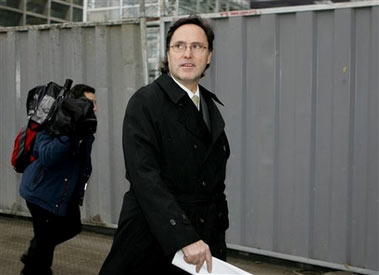The son of former Chilean leader Augusto Pinochet filed a criminal defamation
suit Tuesday against the general's former intelligence chief, rejecting
published accusations that Pinochet became rich off the production and sale of
cocaine.
|

Marco Antonio Pinochet, son of former Gen.
Augusto Pinochet, walks out of a court building where he presented a
lawsuit against former intelligence chief Gen. Manuel Contreras, at a
court in Santiago, Chile, July, 11, 2006. Pinochet announced he will
present defamation charges against the retired general for making
allegations published in a Chilean newspaper that his family enriched
itself from drug trafficking. [AP Photo]
|
Gen. Manuel Contreras was head of Pinochet's police force
from the 1973 coup until 1976.
"There is a whole family affected, you understand, with this slander and
defamation," Marco Antonio Pinochet told a Santiago court, adding that
Contreras' accusation, published in a newspaper report, was especially
distressing to his elderly parents.
Accompanied by his attorney, Luis Pacull, the younger Pinochet filed the suit
in a Santiago courthouse. A slander conviction carries a prison sentence of up
to three years in Chile, where few defamation cases ask for monetary
compensation.
A local newspaper reported Sunday that Contreras claimed in a document that
Pinochet's family gained extensive wealth from trafficking cocaine processed at
a military facility on the outskirts of Santiago. The alleged trafficking
reportedly took place in the 1980s.
The conservative daily La Nacion said the claim was part of a 12-page
document submitted to Judge Claudio Pavez, who is investigating the 1991 death
of a Chilean army colonel.
The former police chief also stated in the document that former chemist
Eugenio Berrios, who worked for the secret police and was found dead on a
Uruguayan beach in 1995, is actually alive and was turned over to the US Drug
Enforcement Agency.
Chilean media reports say that Berrios was believed to be the mastermind
behind the alleged cocaine operation and ran the facility.
"According to Manuel Contreras, the production of cocaine on army property
was authorized by the highest authority (Pinochet), where Berrios worked," La
Nacion reported.
The paper cited Contreras as stating that cocaine was sent to Europe and the
United States, and that the earnings went to "various accounts that the Pinochet
clan maintained in the old continent and the United States."
The Pinochet family has denied the accusations, with Marco Antonio Pinochet
telling daily paper La Segunda that the claims are "a big lie."
Contreras has in the past made accusations that have puzzled Chileans,
including that there were 12,000 foreign rebels in Chile at the time of the coup
orchestrated by Pinochet, and that numerous disappeared political prisoners are
in fact still alive.
Pinochet, now 90, is under indictment for tax evasion amid prosecutors'
investigations of multimillion dollar bank accounts abroad.
Contreras, who completed seven years in jail in connection with the 1976
assassination in Washington of the Chilean ex-chancellor Orlando Letelier, is
currently serving a 12-year prison term for the disappearance of a Chilean
leftist in 1975.
Contreras could not be reached in prison for comment on Tuesday's court
action and he did not immediately issue a statement.
Pavez said, separately, that rumors about Pinochet trafficking drugs were not
new. He confirmed the existence of the document and said it was being passed
along to another judge for review.
In addition, he said he would also hand over documents from the Berrios case
to investigators probing the death of the chemist in Uruguay.